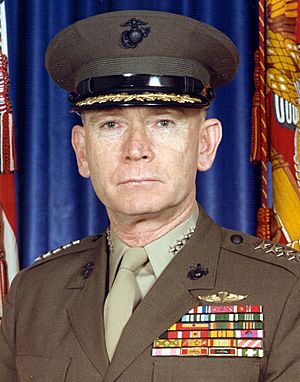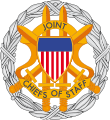Paul X. Kelley facts for kids
Quick facts for kids
Paul X. Kelley
|
|
|---|---|

General Paul Xavier Kelley
|
|
| Birth name | Paul Xavier Kelley |
| Born | November 11, 1928 Boston, Massachusetts, U.S. |
| Died | December 29, 2019 (aged 91) McLean, Virginia, U.S. |
| Buried | |
| Allegiance | United States of America |
| Service/ |
|
| Years of service | 1950–1987 |
| Rank | |
| Commands held | Commandant of the Marine Corps Assistant Commandant of the Marine Corps Rapid Deployment Joint Task Force 4th Marine Division 1st Marine Regiment 2nd Battalion, 4th Marines |
| Battles/wars | Vietnam War
|
| Awards | Defense Distinguished Service Medal Navy Distinguished Service Medal Army Distinguished Service Medal Air Force Distinguished Service Medal Silver Star Legion of Merit (3) w/ Combat "V" Bronze Star Medal (2) w/ Combat "V" |
| Other work | Cassidy & Associates Chairman, American Battle Monuments Commission |
Paul Xavier Kelley (November 11, 1928 – December 29, 2019) was a very important leader in the United States Marine Corps. He was a four-star general, which is the highest rank. From 1983 to 1987, he served as the 28th Commandant of the United States Marine Corps. This means he was the top leader of all Marines.
General Kelley served in the Marine Corps for 37 years. He joined after finishing college in 1950. He was an exchange officer with the Royal Marines in Britain. He also served bravely during the Vietnam War. Before becoming the Commandant, he was the Assistant Commandant of the Marine Corps. After he retired in 1987, he worked with several companies and organizations.
Contents
Early Life and Education
Paul Xavier Kelley was born in Boston, Massachusetts, on November 11, 1928. His parents were Albert and Josephine Kelley. He went to The English High School in Boston and graduated in 1946.
He then studied economics at Villanova University. He earned his Bachelor of Science degree in 1950.
A Career in the Marines
Paul Kelley became a second lieutenant in the United States Marine Corps in June 1950. He joined through a special college program called the Naval Reserve Officer Training Corps. After his basic training, he worked as an infantry officer at Marine Corps Base Camp Lejeune.
In 1952, he served on the USS Salem, a large ship. He was the executive officer and then the commanding officer of the Marine group on the ship. He was promoted to captain in 1953.
Special Training and Reconnaissance
From 1956 to 1957, Kelley worked at the Marine Corps Headquarters in Washington, D.C.. He then went to the United States Army Airborne School to learn how to jump from planes. In 1958, he joined the 2nd Force Reconnaissance Company. This unit specializes in dangerous missions behind enemy lines. He served as its executive officer and then its commanding officer.
From 1960 to 1961, Kelley was an exchange officer with the British Royal Marines. He was one of the few foreigners to earn their special green beret. He trained with them in England and served with their units in places like Aden and Singapore. He was promoted to major in 1961.
Service in the Vietnam War
In 1965, Kelley went to South Vietnam. He first worked in intelligence for the 3rd Marine Amphibious Force. Later, he became the commanding officer of the 2nd Battalion, 4th Marines. He was promoted to lieutenant colonel in 1966.
During his time as a battalion commander, he showed great bravery. He earned several important awards, including the Silver Star and the Legion of Merit. Four years later, from 1970 to 1971, he commanded the 1st Marine Regiment. This was the last Marine regiment to fight in Vietnam.
Rising Through the Ranks
In 1974, Kelley was promoted to brigadier general. As a general, he led the 4th Marine Division. He also directed important Marine Corps training and development centers.
In 1980, he became a lieutenant general. He was chosen to be the first commander of the Rapid Deployment Joint Task Force. This was a new unit designed to respond quickly to crises around the world. On July 1, 1981, he became a full general, making him one of the youngest Marines to reach that rank. He then became the Assistant Commandant of the Marine Corps.
Finally, on July 1, 1983, General Paul X. Kelley was named the Commandant of the Marine Corps. He held this top leadership position until his retirement in 1987.
General Kelley's Promotions
- June 1950 — Second Lieutenant
- April 1952 — First Lieutenant
- December 1953 — Captain
- March 1961 — Major
- January 1966 — Lieutenant Colonel
- April 1970 — Colonel
- August 1974 — Brigadier General
- June 1976 — Major General
- February 1980 — Lieutenant General
- July 1981 — General
After the Marine Corps
After retiring from the Marine Corps in 1987, General Kelley continued to be active. In 1989, he joined a public policy firm in Washington, D.C. He also served as the Chairman of the American Battle Monuments Commission from 1989 to 1994. This commission takes care of U.S. military cemeteries and memorials around the world.
He also served on the boards of directors for several large companies. In 2006, he led a group of military and business leaders. They looked for ways to improve the United States's energy security.
In 2010, he was named an "Honorary Reagan Fellow" by Eureka College. This honor recognized his long life of service and leadership.
General Kelley passed away on December 29, 2019, at the age of 91. He was buried at Arlington National Cemetery.
Awards and Honors
General Kelley received many military awards for his service and bravery. Some of his top military awards include:
- Defense Distinguished Service Medal
- Navy Distinguished Service Medal
- Army Distinguished Service Medal
- Air Force Distinguished Service Medal
- Silver Star
- Legion of Merit (with combat "V" device for valor)
- Bronze Star Medal (with combat "V" device for valor)
- Combat Action Ribbon
He also received many civilian honors and honorary degrees from universities. These awards recognized his leadership and contributions to the country.
See also
- List of United States Marine Corps four-star generals
Images for kids
 | Leon Lynch |
 | Milton P. Webster |
 | Ferdinand Smith |






